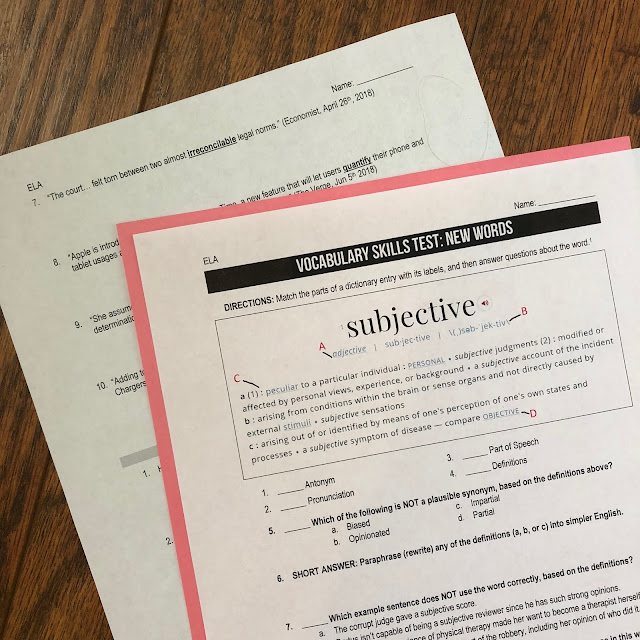Since I don't have a vocabulary book or program that I HAVE to follow at my school, I used to always worry if I was doing enough vocabulary instruction. Even when I was theoretically following best practices or authentically investigating words as they came up in texts, I was concerned about if I was really helping my students become better readers.
After a lot of trial and error, I'm now proud of what we do for middle school vocabulary, which falls into four main areas:
- Specific Words for Texts and Units
- Word of the Week Program (see this post)
- Vocabulary.com use for differentiation (see bottom of post)
- Greek & Latin roots instruction (see this blog post for details)
This mix of interaction, instruction, differentiation, and assessment is working for my students better than ever before (and is showing up in their reading scores).
Today, I'm going to share the details of my Word of the Day/Week setup (also known as the Word Nerd Challenge), which is essentially doing deeper instruction of 40 words (10 words per quarter).
Here's How it Works:
Because I teach middle school, I need the materials to be age-appropriate and easy to read, so I've made my Word of the Week resources minimalist and without clutter -- print-and-go materials with no need to add extra, unnecessary information. I want my students to learn the vocabulary terms with the definitions, synonyms and antonyms, Greek or Latin roots, and so on.
Here are the steps for how I carry out the Word of the Week program in my class:
- Pre-test: Check initial understanding of the 40 words
- Bell-ringer: Use the PowerPoint visual display (or just stick the guided notes packet under your document camera) while students record information into their guided notes journal
- Guided notes: Fill-in-the-blank graphic organizer customized for each word
- Flashcards: Pre-made Quizlet sets (for each 10-word set AND overall)
- Quizzes: Students take a quiz every 10 words
- Bulletin board: Display the cumulative list of words learned this year
- Post-test: Assess growth over time
- Skills test: An optional assessment with 10 NEW words to practice the skills taught through the guided notes journal
- Certificates: Celebrate student victory from the post-test results
- Journal cover and extras for the guided notes, like student directions, growth chart, etc.
Personally, the vocabulary terms that I use in my classroom are ACT/SAT level words, even though I teach middle school. This prepares them for high school and for those tests that they'll have to take eventually to help them gain admission to colleges and universities.
Another benefit of using words at this level is that they commonly appears in real-world contexts, like the news!


If you'd like a ready-made vocabulary program that will take a task off your plate, then you can purchase my Word of the Week Program here (Volume 1) and here (Volume 2) in my Teachers Pay Teachers store. I've taken all of the work out of it for you and created a ready-to-use but editable vocabulary program!
How I use Vocabulary.com
This is a paid program that my school purchased after I requested it. Here's how we used it last year (our first year of the program):
- Every student had an account, and I set them up into their class periods.
- Every student had a goal to "master" 10 words per quarter, at minimum. For some students, this was challenging (especially for those who struggle with reading or vocabulary and took a long time to get the several-questions-right-in-a-row needed to "master" a word). However, many students exceeded this goal - by the hundreds.
- At the end of the quarter, students logged their statistics as well as writing down a short sample of words they mastered and words they're currently working on. (This gave me, and their parents, a view of the difficulty level of the words that the program had given them.)
I'm happy to say that the vocabulary.com program is their favorite online program (more than, say, IXL or CommonLit), and students were authentically choosing to play it in their downtime.
(This review of vocabulary.com is not an ad and is my personal opinion.)
What are some of your favorite methods for teaching vocabulary?
Let me know in the comments!







